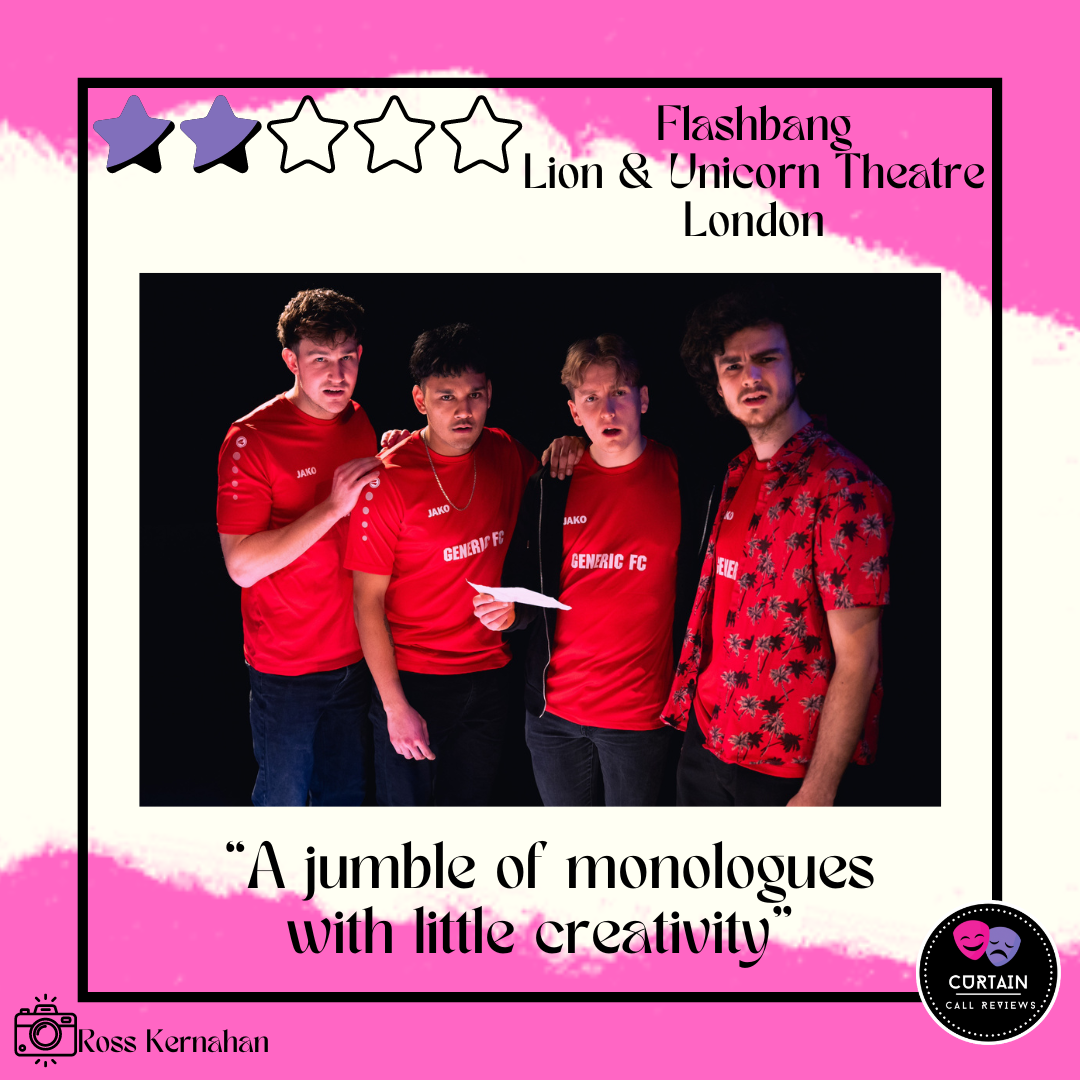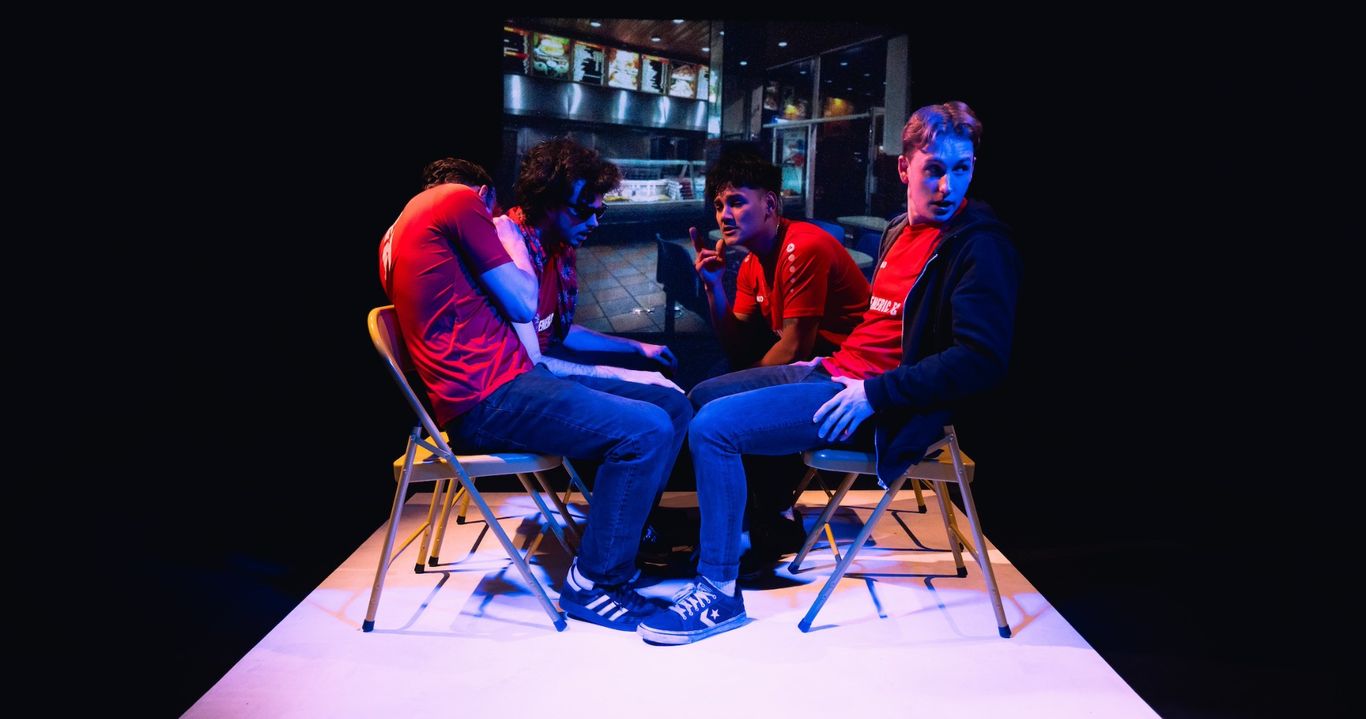
Flashbang
{Reviewed in preview}
Life can always throw something unexpected at you, like a Flashbang. Flashbang is a four person play where friends try to figure out what to do when a member of their “gang” is no longer there.
The play, written by James Lewis, was a jumble of monologues with little creativity and four cast members taking turns telling the audience directly about themselves through small anecdotes. Often this made it feel like there was little character development as we ended up knowing nothing specific about the characters.
Most information about the characters was left to the audience's own interpretation.
Though we rarely got any information about who the characters were, we knew that Ryan (Nick Hardie) was the leader of the group, Jason (Benjamin Booth Bennett) was the ladies man, Andy (Matt Wake) was the sensitive one and Deano (Fred Wardale) was the rebellious one. Any other information was described via similes that were supposed to allow the audience to bring their own experiences to the story. While it should be noted, the cast performed well, unfortunately they had little to work with and draw inspiration from.
For example, the setting was a place described as being in the middle of nowhere and where nothing exciting goes on. Their parents being the typical dad who sends dad jokes on WhatsApp. Their teachers are the ones with the funny hair. Their aunties being the ones who always get involved.

The show was very heavily reliant on assuming that each person seeing the play will decide where it could be set, who that description reminded them of or what they thought that person would behave like. While in some instances this can be an interesting choice, it soon became the only choice that writer James Lewis took with the script.
The phrase “show, don’t tell” is often used for writing exercises and the Flashbang script would have a lot to learn from showing the audience something tangible that is relatable and concrete. Too many scenes were shared monologues lasting for so long it made the audience forget what was being discussed. Or having entire scenes where characters never spoke to each other and exclusively told the audience about a scene involving those characters instead of letting them watch the scene itself.
Sitting in the tech booth was director, and artistic director of Proforca Theatre and Lion and Unicorn Theatre, David Brady who featured as an extra actor during some scenes. The lighting design throughout was inviting and the use of varied colours and spots allowed the audience to be drawn into the scene as much as possible with no other staging techniques being implemented.
Technology, in the form of projections, was also the majority of the set. Aside from four fold away chairs, the set relied on a slideshow of some images to help place a scene or set a mood. With a lot of theatre, a question that has to be asked during a scene is: What does this add? With the projections, the answer was nothing. Most projections were basic and uninventive and simply served as moments that allowed the actors to stop talking for a minute.

As a theatre, the Lion and Unicorn Theatre is a black box and this was striking during the show as little was done to create a scene or sense of show.
While an impressive set would not have been appropriate for the style of show, it regularly felt as though the actors were walking into any room to perform and not using a performance space. There was little done to justify the actors talking directly to the audience and establish a relationship between show and spectator.
This was exacerbated by the movement, directed by Lucy Glassbrook, which primarily involved the four actors swapping corners while moving around in a square. Some scenes, including one based in a nightclub, featured a little more movement however their dance moves matched whomever was speaking as they took it in turns. After a few times having a turn, the pattern became obvious and monotonous.
While the premise of the play could have been a powerful and moving piece about Men’s Mental Health and the stigma around talking and addressing feelings, this emotion and message was sorely missing. Instead, the show focused on alcoholism and existentialism as coping mechanisms for when life gets too tough. The message at the end seemed to be “Life is short so go get drunk and mess about because that’s what our deceased friend would have wanted.”
Aside from the four “lads” that featured, the show also depicted the women in their lives as mostly inconveniences with there being close to no inclusion or positive portrayal of women throughout the story.

Flashbang could have been about how accidents happen and how we all have to find ways to keep going and looking for the bright side of life.
It could have included a powerful message inspiring men to talk about their feelings and struggles with their friends and destigmatize the masculine image. Instead, it lacked any physical creativity to bring a basic storyline to life in a black box theatre.
This show was reviewed on the 21st February 2024 in preview at Lion and Unicorn Theatre, London where it runs until the 9th March 2024. Tickets available here: What's On — LION & UNICORN THEATRE (thelionandunicorntheatre.com)
Review written by Ryan Lenney
AD/Gifted
Photo credit: Ross Kernahan
Check out other reviews from Curtain Call Reviews and get in touch to have our reviewers head to your show.